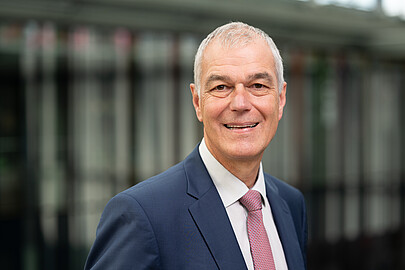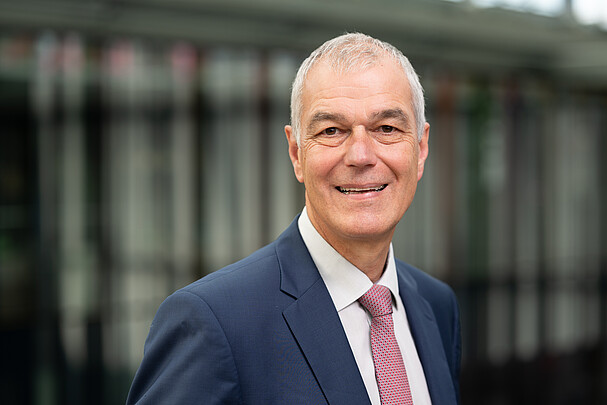Prof. Dr.-Ing. habil. Jürgen Müller

 © INTERGEO 2024, HINTE Expo & Conference GmbH
© INTERGEO 2024, HINTE Expo & Conference GmbH
30167 Hannover

 © INTERGEO 2024, HINTE Expo & Conference GmbH
© INTERGEO 2024, HINTE Expo & Conference GmbH
- Executive Director of the Institute of Geodesy
-
Other Functions at the University
- Admissions and Examination Board for Geodetic Science and Geoinformatics - Chair
- Admissions and Examination Board for Navigation and Environmental Robotics - Chair
- Curriculum and Teaching Committee for Geodetic Science and Geoinformatics - Deputy Chair
- QUEST Leibniz Forschungsschule - Board
- HITec – Hannover Institute of Technology - Board
- Exzellenzcluster QuantumFrontiers – Board
- Forschungszentrum FZ:GEO - Board
- Curriculum
-
Memberships, Activities and Working Groups
- Fellow of the International Association of Geodesy (IAG)
- President of the IAG initiative Novel Sensors and Quantum Technology for Geodesy
- Ordinary Member of the Leibniz Society of Sciences to Berlin e. V.
- Member of the DGK (German Geodetic Commission of the Bayerischen Akademie der Wissenschaften) and member and since 2015 chair of the section "geodesy"
- Member of the class of engineering sciences ofthe Braunschweigische Wissenschaftlichen Gesellschaft, chair from 2012 to 2017
- German Representative in IAG and IUGG and IAG Representative forGeodesy in the National Committee of Geodesy and Geophysics (NKGG), since 2012 speaker of the NKGG
- Member of the Steering Committee of DVW (German Society of Geodesy, Geoinformation and Land Management)
- Board member of the Leibniz Forschungsschule QUEST (Quantum Engineering and Space-Time Research) and of the HITec research facility at Leibniz Universität Hannover
- Board member of the Exzellenzcluster QuantumFrontiers at Leibniz Universität Hannover
- Board member of the Forschungszentrums FZ:GEO at Leibniz Universität Hannover
- Member of the European GRACE Science Team and other research programmes focusing on gravity field satellite missions
- Editorship of the German Geodetic Journal zfv – Zeitschrift für Geodäsie, Geoinformation und Landmanagement
-
Awards and Honours
-
2023 Vening Meinesz Medal of the European Geosciences Union (EGU), Division of Geodesy
-
2020 Northern German Science award together with University Bremen for cooperation project geodesy and climate research
-
2019 Fellow of the International Association of Geodesy
- 1993 Award of „Bund der Freunde der TU München“ for the best PhD thesis in the Faculty of Civil and Geodetic Engineering between 1991 and 1993
-
-
Important Publications
Biskupek L., Singh V.V., Müller J. (2022): Estimation of Earth Rotation Parameter UT1 from Lunar Laser Ranging Observations. Geodesy for a Sustainable Earth: 2021 Scientific Assembly of the IAG, Springer Berlin Heidelberg, DOI: 10.1007/1345_2022_178
Delva P; Z Altamimi; A Blazquez; M Blossfeld; J Böhm; P Bonnefond; J Boy; Sean Bruinsma; G Bury; M Chatzinikos; A Couhert; C Courde; W Enderle; P Exertier; R Dach; V Dehant; S Dell’Agnello; G Elgered; S Glaser; R Haas; W Huang; U Hugentobler; A Jäggi; O Karatekin; F Lemoine; C Le Poncin-Lafitte; S Lunz; B Männel; F Mercier; L Métivier; B Meyssignac; J Müller; A Nothnagel; F Perosanz; R Rietbroek; M Rothacher; H Schuh; H Sert; K Sosnica; P Testani; J Ventura-Traveset; G Wautelet; R Zajdel (2023): GENESIS: Co-location of Geodetic Techniques in Space. Earth, Planets, Space Vol. 75, No. 5, DOI: 10.1186/s40623-022-01752-w
Hofmann, F., Müller, J. (2018): Relativistic Tests with Lunar Laser Ranging. Classical and Quantum Gravity Vol. 35, No. 035015, DOI: 10.1088/1361-6382/aa8f7a
Klemme, A., Warneke, T., Bovensmann, H., Weigelt, M., Müller, J. , Rixen, T., Notholt, J. Lämmerzahl, C. (2024): Sediment transport in Indian rivers high enough to impact satellite gravimetry. Hydrology and Earth System Sciences Vol. 28, p. 1527–1538, DOI: 10.5194/hess-28-1527-2024
Kupriyanov, A., Reis, Knabe, A., Fletling, N., HosseiniArani, A., Romeshkani, M., Schilling, M., Müller, V., Müller, J. (2024): Analysis of novel sensors and satellite
formation flights for future gravimetry missions. International Association of Geodesy Symposia. DOI:10.1007/1345_2024_279Müller J., Dirkx D., Kopeikin S., Lion G., Panet I., Petit G., Visser P. (2018): High Performance Clocks and Gravity Field Determination. In: Space Science Rev. Vol. 214, No. 1, p. 5. DOI: 10.1007/s11214-017-0431-z
Müller J., Murphy T. W., Schreiber U., Shelus P., Torre J., Williams J., Boggs D., Bouquillon S. Bourgoin, Hofmann F. (2019): Lunar Laser Ranging: a tool for general relativity, lunar geophysics and Earth science. In: Journal of Geodesy Vol. 93, No. 11, pp. 2195–2210. DOI: 10.1007/s00190-019-01296-0
Müller J., Soffel M., and Klioner S. A. (2008): Geodesy and Relativity. In: Journal of Geodesy, Vol. 82, No. 3, pp. 133–145. DOI: 10.1007/s00190-007-0168-7
Müller, J., Wu, H. (2020): Using quantum optical sensors for determining the Earth’s gravity field from space. Journal of Geodesy Vol. 94, Nr. 71 doi: 10.1007/s00190-020-01401-8
Torge W., Müller J., and Pail, R. (2023): Geodesy. 5th ed., de Gruyter Oldenbourg. DOI: 10.1515/9783110723304.
Vincent, A., Müller, J. (2023): Detection of time variable gravity signals using terrestrial clock networks. Advances in Space Research, online. DOI: 10.1016/j.asr.2023.07.058.




